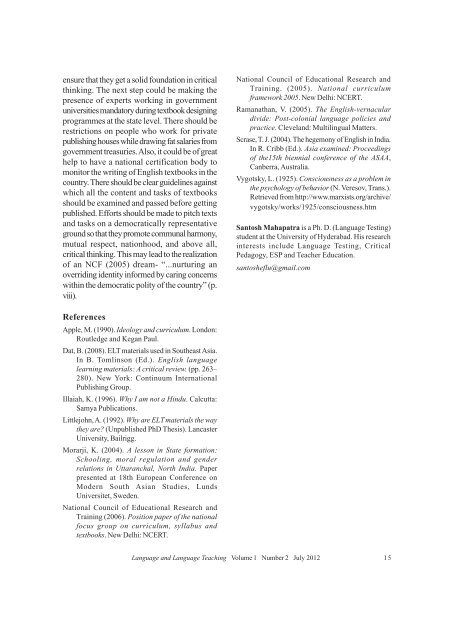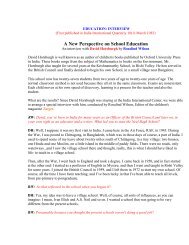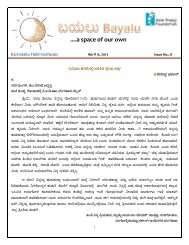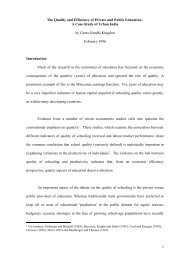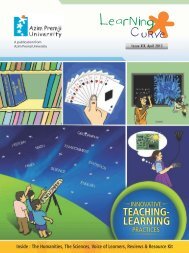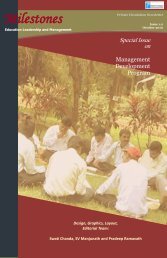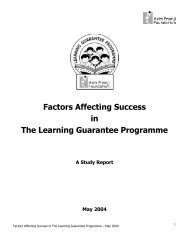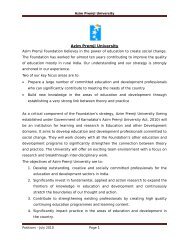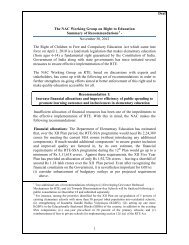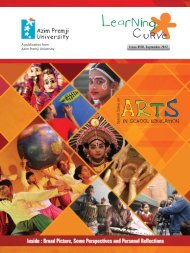of right, wrong, good, bad, clean, hygienic, <strong>and</strong>social acceptance, etc., is also shaped by Englishtextbooks, because of the power, prestige <strong>and</strong>glamour attached with its learning. Ultimately,what the students start believing in is exactlywhat the politically dominant class wants themto believe. Such beliefs get fossilized; then theindividual gradually loses the power ofquestioning; <strong>and</strong> finally, he/she gets assimilatedinto the belief system of the dominant class.Government <strong>and</strong> private school EnglishtextbooksThe government-private divide is perhaps themost obvious factor when it comes to classpolitics in ELT in India; NCERT, CBSE, ICSE<strong>and</strong> the state educational boards, all produce theirown English textbooks. As I have discussedearlier, textbook designing at the central levelinvolves more expertise than in the states.However, there has been a long <strong>and</strong> inconclusivedebate about the validity of a national curriculum.It is virtually impossible to cater to the needs ofa large variety of students from differentlinguistic <strong>and</strong> socio-cultural backgrounds throughone textbook at one level. Moreover, theinclusion of a high percentage of foreign Englishtexts in the English textbooks, such as in theICSE (Classes IX <strong>and</strong> X) <strong>and</strong> NCERT(‘Marigold’ for Class V), is ridiculous <strong>and</strong>unreasonable.The state-level textbook designing in India hasimproved over the last decade. But issues basedon caste, class, gender, sexuality, politics, religion,etc., have remained forbidden territories fortextbook writers, <strong>and</strong> ‘critical thinking’ has beenconfined to garnishing policy materials. So thereis little scope for preparing students to challengethe unequal <strong>and</strong> undemocratic practicesprevalent in Indian societies.Like the elitist set-up of private English mediumschools, the English textbooks used in suchschools are often designed by well knownmaterials designers <strong>and</strong> produced by renownedpublishing houses. The absence of a ruleemphasizing the use of only governmentproducedtextbooks encourages these practices.It is not only the layout <strong>and</strong> price of the books,but also the texts <strong>and</strong> tasks presented in themthat ensure the exclusion of students fromunderprivileged backgrounds. Textbooks aremere tools in this practice of hegemony in whichEnglish as a cultural capital helps maintain thedominance of the middle <strong>and</strong> upper class overthe underprivileged class. In this set-up, all thegood intentions of the ‘education for all’ policyremain unattended.Decolonizing <strong>and</strong> democratizing EnglishtextbooksThe politics of English textbooks is a part ofwhat Ramanathan (2005) calls ‘assumptionsnexus’. She defines it in the following terms:“…everything in class-related conventions thatinform how <strong>and</strong> why particular class groups live<strong>and</strong> make the choices they do in almost everyrealm of everyday existence, including thoserelated to schooling, child-rearing, literacypractices at home, clothing <strong>and</strong> publicappearances, food, how money gets spent, bodysizes, weight, health, nutrition <strong>and</strong> hairdos <strong>and</strong>,most importantly, in the present case, opting forfluency in English (sometimes through an EMeducation)” (p. 37).So changing the writing practice of textbooks isa huge challenge because all the stakeholdersin the decision-making position are part of thesocietal structure it is based on. However, thereis a possibility of changing the socially generated<strong>and</strong> constructed consciousness through a criticalcurricular pattern based on democraticideologies. Introducing critical thinkingcomponents in training programmes for textbookwriters <strong>and</strong> teachers may make a good start.However, it will be better to have suchcomponents in pre-service programmes, to<strong>Language</strong> <strong>and</strong> <strong>Language</strong> <strong>Teaching</strong> Volume 1 Number 2 July 2012 14
ensure that they get a solid foundation in criticalthinking. The next step could be making thepresence of experts working in governmentuniversities m<strong>and</strong>atory during textbook designingprogrammes at the state level. There should berestrictions on people who work for privatepublishing houses while drawing fat salaries fromgovernment treasuries. Also, it could be of greathelp to have a national certification body tomonitor the writing of English textbooks in thecountry. There should be clear guidelines againstwhich all the content <strong>and</strong> tasks of textbooksshould be examined <strong>and</strong> passed before gettingpublished. Efforts should be made to pitch texts<strong>and</strong> tasks on a democratically representativeground so that they promote communal harmony,mutual respect, nationhood, <strong>and</strong> above all,critical thinking. This may lead to the realizationof an NCF (2005) dream- “...nurturing anoverriding identity informed by caring concernswithin the democratic polity of the country” (p.viii).National Council of Educational Research <strong>and</strong>Training. (2005). National curriculumframework 2005. New Delhi: NCERT.Ramanathan, V. (2005). The English-vernaculardivide: Post-colonial language policies <strong>and</strong>practice. Clevel<strong>and</strong>: Multilingual Matters.Scrase, T. J. (2004). The hegemony of English in India.In R. Cribb (Ed.). Asia examined: Proceedingsof the15th biennial conference of the ASAA,Canberra, Australia.Vygotsky, L. (1925). Consciousness as a problem inthe psychology of behavior (N. Veresov, Trans.).Retrieved from http://www.marxists.org/archive/vygotsky/works/1925/consciousness.htmSantosh Mahapatra is a Ph. D. (<strong>Language</strong> Testing)student at the University of Hyderabad. His researchinterests include <strong>Language</strong> Testing, CriticalPedagogy, ESP <strong>and</strong> Teacher Education.santosheflu@gmail.comReferencesApple, M. (1990). Ideology <strong>and</strong> curriculum. London:Routledge <strong>and</strong> Kegan Paul.Dat, B. (2008). ELT materials used in Southeast Asia.In B. Tomlinson (Ed.). English languagelearning materials: A critical review. (pp. 263–280). New York: Continuum InternationalPublishing Group.Illaiah, K. (1996). Why I am not a Hindu. Calcutta:Samya Publications.Littlejohn, A. (1992). Why are ELT materials the waythey are? (Unpublished PhD Thesis). LancasterUniversity, Bailrigg.Morarji, K. (2004). A lesson in State formation:Schooling, moral regulation <strong>and</strong> genderrelations in Uttaranchal, North India. Paperpresented at 18th European Conference onModern South Asian Studies, LundsUniversitet, Sweden.National Council of Educational Research <strong>and</strong>Training (2006). Position paper of the nationalfocus group on curriculum, syllabus <strong>and</strong>textbooks. New Delhi: NCERT.<strong>Language</strong> <strong>and</strong> <strong>Language</strong> <strong>Teaching</strong> Volume 1 Number 2 July 2012 15


